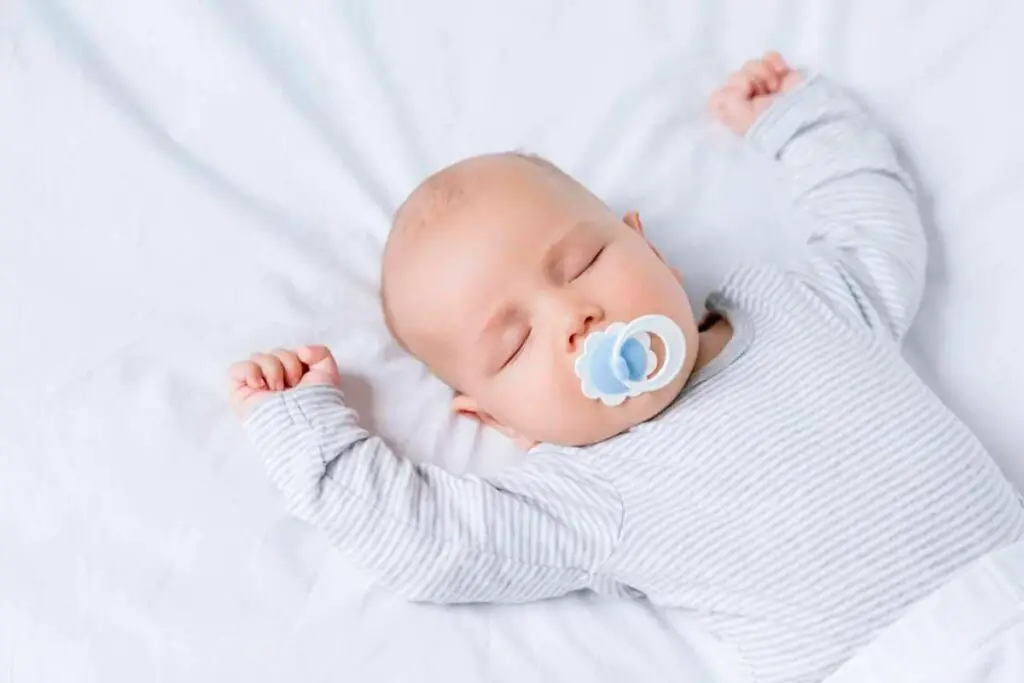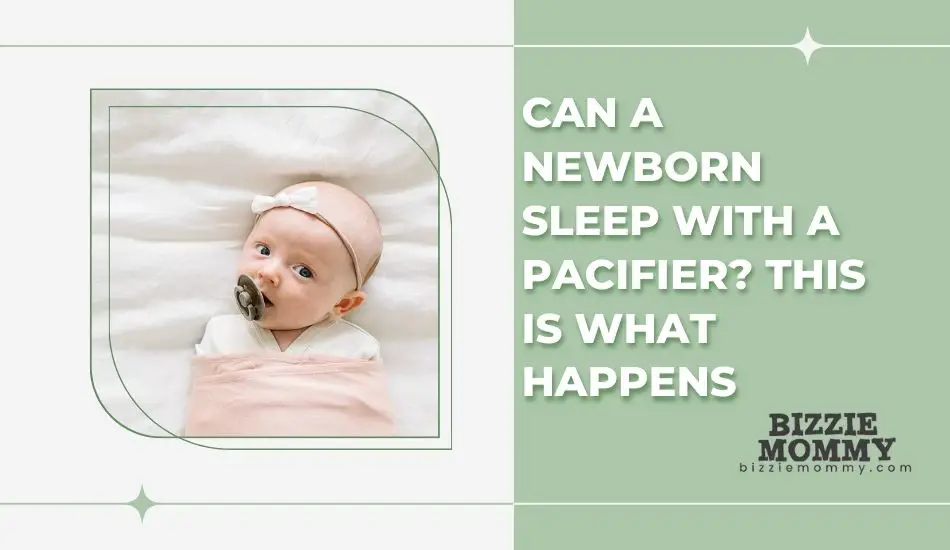Parents often opt for strategies like feeding, bouncing, singing, or playing with newborn babies to make them fall asleep. Pacifiers are also proved successful in calming the baby down and enabling him to sleep early and peacefully. But the majority of parents, especially new parents, ask an avalanche of questions about whether using pacifiers is safe for their baby or “Can a newborn sleep with a pacifier?”
Researchers from all around the world state that it is safe for babies to fall asleep with pacifiers. Some studies have also suggested that giving your baby a pacifier during sleep or nap time may be associated with a reduced risk of sudden infant death syndrome (SIDS). Moreover, some researchers have also suggested that breastfed infants should only sleep with a pacifier once they are at least 3 to 4 weeks old.
Should You Let Your Newborn Sleep With a Pacifier?
Many parents are concerned and wonder if a newborn can sleep with a pacifier. It’s up to you whether you want to give your newborn a pacifier or not.
Some parents get pacifiers because their baby may face trouble falling asleep or gets scared while sleeping or can’t sleep peacefully. In addition, some babies don’t take pacifiers easily, while others take them from the first day. Taking all these scenarios into account, we can’t predict the safe time for your newborn to take a pacifier. It certainly depends entirely on your decision and also if your baby is breastfed or bottle-fed. If he is breastfed, delaying the pacifier 3 to 4 weeks is the safest option.
If you are struggling with your decision to give your baby a pacifier, here we quote some positive reviews showing the importance of using pacifiers.
Training the Oral Sucking Muscles
Pacifiers are a safe way to train your baby’s oral muscles and sucking ability. Besides, sometimes a baby’s sucking reflex called non-nutritive sucking is uneven when his tummy is full. In that case, giving him a pacifier can fulfill this requirement without gaining any extra weight by feeding him again and again.
Here are some ways in which sleeping with a pacifier can positively impact your baby:
- Gives him the comfort he needs when you are not around.
- Helps the baby fall asleep with extra courage and peace.
- Relaxes him by releasing endorphins in the body.
- Pacifiers can be the best sleeping buddies for your baby, as they create a safe infant sleeping environment.
Prevents SIDS Among Infants
As quoted earlier, the American Academy of Pediatrics (AAP) has published a report explaining how pacifiers prevent sudden infant death (SIDS). So pacifiers are suitable for day and nighttime baby sleep with the advantage of preventing SIDS.
Is It Completely Safe For My Baby to Sleep with a Pacifier?
Yes, it is completely safe to let your newborn sleep with a pacifier. However, as mentioned earlier, breastfed babies should be given a pacifier with a delay of 3 to 4 weeks.
According to the American Academy of Pediatrics (AAP) giving your baby a pacifier while sleeping reduces the risk of sudden infant death syndrome (SIDS). So using a pacifier is a safe option if you want to prevent SIDS and other sleep-related deaths.
However, some safety measures should be followed when giving a pacifier while a baby sleeps:
- Choose a pacifier with holes in the shield (the shield is the part that rests on the baby’s lips).
- Choose a pacifier with a shield of 1.5 inches. When the baby grows, keep changing the pacifier and buy a bigger one every time so that the pacifier doesn’t fill the baby’s mouth completely.
- Avoid attaching the baby’s pacifier to clothes or hands.
- Use only one-piece pacifiers.
- Avoid such pacifiers that have hooks or stuffed animals hanging.
- If your baby is learning to breastfeed, don’t give him a pacifier, especially during nighttime sleep or even daytime nap.
- Make sure to clean it with hot water and disinfect it regularly.
- Regularly check the pacifier’s condition. Follow the expiration date of the product and if it doesn’t have one, check its condition now and then. If it appears yellowish, or dirty or if any cracking signs appear throw it and buy a new one.
What Is the Difference Between Breastfed and Bottle-Fed Newborns?
The scenarios are different for the breastfed and bottle-fed babies concerning the pacifiers. Here we have enlisted some important research carried out in this regard to help you know the difference between both situations.
Breastfed Babies
Pacifiers can lead to nipple confusion in breastfed babies, so experts recommend delaying letting breastfed babies sleep with pacifiers for at least 3 to 4 weeks.
The American Academy of Pediatrics (AAP) also published a report in which they stated that the safe time of giving breastfed babies a pacifier is 3 to 4 weeks. There is some research available that suggests using pacifiers earlier to develop the oral motor skills of the baby. However, to be on the safer side, a 3 to 4-week delay is an option. In addition, you can consult your child’s pediatrician or medical expert before giving a pacifier to your newborn breastfed baby.
Bottle-Fed Babies
While breastfed babies are advised not to have pacifiers before 3 to 4 weeks, bottle-fed babies can take pacifiers right after birth. It depends on the parents’ decision. However, experts recommend parents let their newborn have a pacifier even while sleeping.
Using a pacifier can speed up the learning process of oral feeding for the infant and reduces the risk of SIDS. It helps him develop his sucking muscles, so he learns to feed himself faster with the help of his sucking reflex.
Some babies face trouble getting fed from their mother’s breast, and experts recommend their parents let their preterm baby practice on a pacifier. It will help him feed faster, gain weight quickly and fall asleep peacefully.
Why Can Bottle-Fed Babies Sleep with a Pacifier, But Not Breastfed?

The sucking reflex is an instinct, but it also develops with practice and the baby’s age. Pacifiers are not recommended for breastfeeding babies until they reach 3 to 4 weeks of age. The reason could be that newborns get frustrated while differentiating between the breast and a pacifier.
Not only this, he can sometimes act weirdly and show breast refusal while nourishing.
But bottle-fed babies don’t face a huge difference, so it causes less frustration for them. Moreover, giving them pacifiers early helps them master their sucking reflex and oral muscles, so they can nourish themselves using a bottle quite easily.
When to Remove Pacifier from a Sleeping Baby?
There is no need to remove the pacifier from the baby’s mouth while he is sleeping. It may disturb his sleep or wake him up from the sound sleep he’s enjoying, and it will be difficult for him to fall asleep again.
Moreover, if the pacifier falls out of his mouth while sleeping, that’s quite normal. So don’t put it back.
Benefits and Risks of Giving Your Newborn a Pacifier When Going to Sleep
Helps to Calm the Baby
Some babies create fussiness during medical procedures or daily activities, so using a pacifier can calm them down. Infants feel way more relaxed while pacifiers while playing and fall asleep quickly.
Helps to Relax Non-Nutritive Sucking
Babies face the sucking reflex even when they are not being fed. However, they can’t be fed now and then. It will be frustrating for the parents and also causes weight gain. Pacifiers are a great source of soothing this non-nutritive sucking reflex.
Infant Leaves Sucking the Thumb
If your baby sucks his thumb 24/7, try giving him a pacifier. It is a safe and healthy way to soothe the sucking reflex compared to the thumb, which causes many mouth and tooth problems. Moreover, it is easier for a child to leave the pacifier compared to a thumb.
In addition to many pros associated with a pacifier, there are some issues related to it.
A baby’s pacifier, when dirty and worn out, can spread germs and infections in your newborn’s mouth. It can also interfere with a baby’s breastfeeding ability due to nipple confusion.
Studies have shown that using pacifiers after the age of 2 years can cause increased risks of crooked teeth and ear infections.
Final Verdict
Pacifiers are a great tool to help a newborn baby sleep and soothe his non-nutritive sucking reflex. Sleeping with a pacifier makes him feel more relaxed and safe during the day and nighttime sleep.
However, breastfed infants are not advised to take pacifiers earlier than 3 to 4 weeks to prevent nipple confusion. According to the American Academy of Pediatrics (AAP), using a pacifier reduces the risk of SIDS (sudden infant death syndrome) and other sleep-related infant deaths, which enhances its importance among parents. While its long-term use can cause some risks including ear infections.
Just follow the pacifier safety measures and necessary points we listed above to prevent any kind of hazard and you are good to go.

